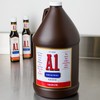Food Animal Respiratory Flashcards
(30 cards)
- Group of dairy calves having outbreak of respiratory disease, otitis, CN VII deficits, septic joints. Top differential?
a. Histophilus somni
b. BHV1
c. Mycoplasma bovis
d. Pasteurella multocida
c. Mycoplasma bovis
What is considered pathognomonic for Vena Caval Thrombosis and Metastatic Pneumonia in cattle?
- Respiratory signs with anemia
- Widespread wheezes
- Hemoptysis
By what means do bovine herpesvirus-1 spread systemically to other organs?
- Immune cells
- Red blood cells
- Nerve fibers
- Herpes-associated protein-B (HAPB)
A) Immune cells
Lymphocytes and macrophages, although produce little virus appear to be a means by which virus reaches extra-respiratory sites after respiratory infections.
In BHV-1, how are the lungs in necropsy?
Lesions in respiratory, ocular, and reproductive mucosa, but do NOT extend to the lungs. “Boom!”

Diagnosis of extrinsic allergic alveolitis “bovine farmer’s lung”
Antibody to S. rectivirgula
Cow with lesion in lung caudodorsally
Bovine respiratory syncytial virus
- How does the immune response to vaccination cause worsening of disease with bovine syncytial virus?
a. Increased IL 8 production –> overwhelming neutrophil chemotaxis –> lung tissue destruction
b. Increased IgG production from vaccine –> purpura-like vasculitis–> systemic illness
c. Increased IgE from vaccine/natural exposure –> degranulation of mast cells–> severe lower airway pathology
d. Increased adhesion of neutrophils to pathogen –> secondary neutropenia + immune suppresion
c. Increased IgE from vaccine/natural exposure –> degranulation of mast cells–> severe lower airway pathology
What is the most common isolate of Mannheimia hemolytica found in pneumonic lung due to BRD?
- A1
- A2
- A7
- A9
A. A1
- A2 in sheep and goats

Which is the most common virus isolated from lungs of calves euthanized for pneumonia
Bovine parainflueza 3
“Calf pneumonia” is usually referred to which infectious agent?

P. multocida
- Chronic or ongoing pneumonia
Lesions of Haemophilus in cattle
Pleuritis, myocarditis, fibrinopurulent pneumonia
This clinical presentation corresponds most likely to which condition?

Ovine Pulmonary Adenocarcinoma
- Frothy fluid in the respiratory tract
- Evident with the wheelbarrow test
Important source of infection of M. mycoides LCT
Does that recover from mastitis become chronic carriers
Main characteristic of M. hemolytica lung lesions
CV, fibrinous pleuritis **Necrotizing fibrinous pleuropneumonia**

What is the function of the surface glycoproteins in BHV-1 infection?
Surface glycoproteins gC, gD, gB interact with heparan sulfate proteoglycans for cell attachment and entry
What are the six different components of Mannheimia hemolytica that causes pathogenicity ?
- Exotoxin (leukotoxin) - binds to cells via CD18 - contact increases expression of LFA-1 on ruminant leukocytes (increases sensitivity to injury). Low concentration: leukocyte death via apoptosis. Higher concentration: cell lysis.
- LPS - Excessive inflammation. Potentiates effects of Leukotoxin. IL-8 expression is especially important because it is a major inducer of neutrophil chemotaxis.
- Polysaccharide capsule - aids in attachment and prevents phagocytosis by neutrophils
- IROMP (Iron regulated outer membrane proteins)- bind transferrin - alters function of neutrophils
- Adhesions - mediate attachment to host cells
- Neuraminidase - aid in host colonization - decrease viscosity of respiratory mucus and decrease repellant negative charge on host cells by cleaving sialic acid residues.
Lung lesions for M. bovis
- Caseonecrotic lesions
- Foci of coagulation necrosis
Pathophysiology of OPP
Ingestion of milk/colostrum → monocytes or macrophages → spread to tissues
With respect to BRSV and vaccination of calves before 1 month old
vaccination of calves before 1 month old is not effective.
- Which best describes the pathophys of interstitial pneumonia/fog fever?
a. eat lush grass with tryptophan –> forms perilla ketones –> directly kills clara cells/type 1 pneumocytes in lungs
b. eat lush grass with tryptophan –> forms 3 methyl-indole in rumen –> directly kills clara cells/type 1 pneumocytes in lungs
c. eat lush grass with tryptophan –> forms perilla ketones –> metabolized by clara cells/type 1 pneumocytes in lungs into toxic byproducts
d. eat lush grass with tryptophan –> forms 3 methyl-indole in rumen –> metabolized by clara cells/type 1 pneumocytes in lungs into toxic byproducts
d. eat lush grass with tryptophan –> forms 3 methyl-indole in rumen –> metabolized by clara cells/type 1 pneumocytes in lungs into toxic byproducts
Test for carriers of Mycoplasma mycoides-large colony type
PCR of auricular swabs
“hot swollen joints”
3 important features of ABPEE
- Absence of coughing
- No signs of sepsis
- No adventitious lung sounds
Main features in the pathogenesis of H. somni
Binds to Fc in antibody –> preventing opsonization
Vasculitis and vascular thrombi Induce IgE
Cow in feedlot with fever, cough, red nose. Main differential?

BHV-1



